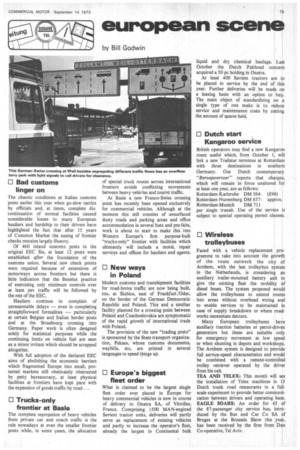european scene
Page 77

If you've noticed an error in this article please click here to report it so we can fix it.
by Bill Godwin 0 Bad customs linger on
The chaotic conditions at Italian customs posts earlier this year when go-slow tactics by officials and, at times, complete discontinuation of normal facilities caused considerable losses to many European hauliers and hardship to their drivers have highlighted the fact that after 15 years of Common Market the easing of frontier checks remains largely illusory.
Of 460 inland customs posts in the original EEC Six, at least 12 posts were established after the foundation of the customs union. Several new check points were required because of extensions of motorways across frontiers but there is little indication that the Benelux practice of exercising only minimum controls over at least psv traffic will be followed by the rest of the EEC.
Hauliers continue to complain of unreasonable delays — even in completing straightforward formalities — particularly at certain Belgian and Italian border posts and at the Strasbourg crossing into Germany. Paper work is often designed solely for statistical purposes while the continuing limits on vehicle fuel are seen as a minor irritant which should be scrapped altogether.
With full adoption of the declared EEC aims of abolishing the economic barriers which fragmented Europe into small, protected markets still obstinately obstructed by petty bureaucracy, at least physical facilities at frontiers have kept pace with the expansion of goods traffic by road ...
0 Trucks-only frontier at Basle
The complete segregation of heavy vehicles from private car and coach traffic is the rule nowadays at even the smaller frontier posts while, in some cases, the allocation of special truck routes across international frontiers avoids conflicting movements between heavy vehicles and tourist traffic.
At Basle a new Franco-Swiss crossing point has recently been opened exclusively for commercial vehicles. Although at the moment this still consists of unsurfaced dusty roads and parking areas and office accommodation in several huts and pre-fabs, work is about to start to make this into Western Europe's first purpose-built "trucks-only" frontier with facilities which ultimately will include a motel, repair services and offices for hauliers and agents.
0 New ways in Poland
Modern customs and transhipment facilities for road-borne traffic are now being built, too, at Slubice, east of Frankfurt/Oder, on the border of the German Democratic Republic and Poland. This and a similar facility planned for a crossing point between Poland and Czechoslovakia are symptomatic of the rapid growth of international trade with Poland.
The provision of the new "trading posts" is sponsored by the State transport organization, Pekaes, whose customs documents, waybills, etc, are printed in several languages to speed things up.
0 Europe's biggest fleet order
What is claimed to be the largest single fleet order ever placed in Europe for heavy commercial vehicles is now in course of delivery to Onatra SA, of Vitrolles, France. Comprising 1500 MAN-engined Saviern tractor units, deliveries will partly serve as replacement of existing vehicles and partly to increase the operator's fleet, already the largest in Continental bulk liquid and dry chemical haulage. Last October the Dutch Pakhoed concem acquired a 50 pc holding in Onatra.
At least 400 Saviem tractors are to be placed in service by the end of this year. Further deliveries will be made on a leasing basis with an option to buy. The main object of standardizing on a single type of one make is to reduce service and maintenance costs by cutting the amount of' spares held.
0 Dutch start Kangaroo service
British operators may find a new Kangaroo route useful which, from October 1, will link a new Trailstar terminus at Rotterdam with three destinations in southern Germany. Our Dutch contemporary "Beroepsvervoer" reports that charges, which will remain in force unaltered for at least one year, are as follows:
Rotterdam-Karlsruhe DM 564(£94) Rotterdam-Nurem burg DM 657approx Rotterdam-Munich DM 711 per single transit. Use of the service is subject to special operating permit clauses.
0 Wireless trolleybuses
Faced with a vehicle replacement programme to take into account the growth of the route network the city of Arnhem, with the last trolleybus system in the Netherlands, is considering an auxiliary trailer-mounted battery unit to give the existing fleet the mobility of diesel buses. The system proposed would allow the trolleybuses to extend routes into areas without overhead wiring and to enable services to be maintained in case of supply breakdown or where roadworks necessitate detours.
Many European trolleybuses have auxiliary traction batteries or petrol-driven generators but these are suitable only for emergency movement at low speed or when shunting in depots and workshops. The Arnhem system is designed to provide full service-speed characteristics and would be combined with a remote-controlled trolley retriever operated by the driver from his cab.
TEA AND TELEX: This month will see the installation of Telex machines in 15 Dutch trunk road restaurants in a fullscale experiment to provide better communication between drivers and operating base. EAGLE SOARS: An order for 45 of the 87-passenger city service bus, introduced by the Bus and Car Co SA of Bruges at the Brussels Show this year, has been received by the firm from Dan Co-operative, Tel Aviv.




































































































































